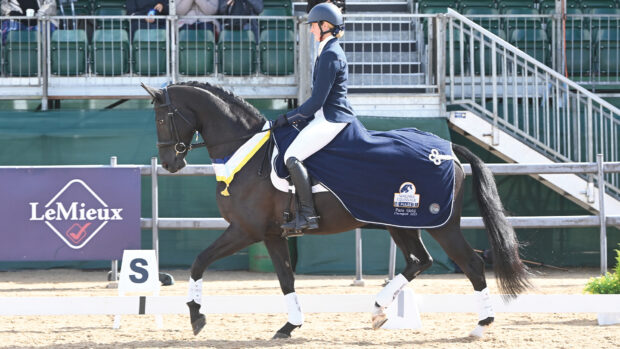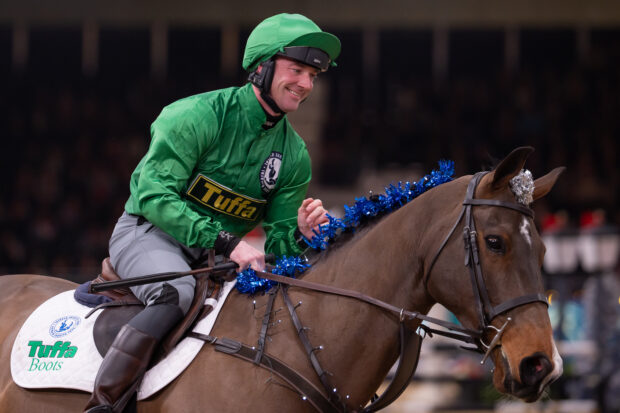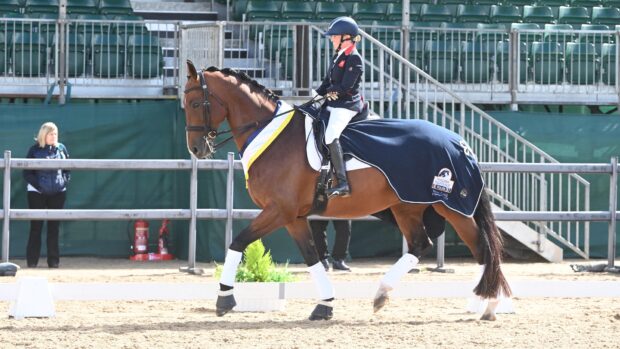To celebrate the Injured Jockeys Fund (IJF) being Horse & Hound's charity for 2016, we meet some of the equestrians who have benefitted from its help. Para dressage rider Ed Chanin talks to H&H about how he has got back on track following a riding accident
Edward Chanin grew up on a family farm based on the outskirts of Tiverton, Devon. He grew up surrounded by horses and by the tender age of nine he was producing ponies and competing in junior BS classes, as well as hunting, one-day events and working hunter pony classes.
As soon as he was old enough Edward started riding in point-to-points and at sixteen, he left school to go and work for National Hunt trainer Philip Hobbs.
In October 2001, 18-year-old Edward had his first winner under Rules for Philip on the six-year-old bay gelding, Gunther McBride in the Smart Choice Amateur Riders Novice Hurdles at Exeter. With this success under his belt Edward’s racing career looked bright.
Less than two months later on 19 December 2001, however, Edward suffered a near fatal fall while jump schooling. He broke his back (T9 and T10), sustained serious head trauma, was resuscitated twice, and placed on life support for several weeks. Complications also included bacterial infections MRSA and C. diff.
‘I don’t remember the accident’
Two months later, Edward woke up. “The first thing I was aware of was the bird walking along the roof,” he recalls. “I don’t remember the accident, or anything that happened two weeks before it.”
Six months after the accident, and after stays in five different hospitals, Edward was finally allowed home. His injuries had left him paralaysed down his right side, and it was going take two and a half years of constant rehabilitation to learn how to walk and talk again.
“The Mardon Neuro-Rehabilition Centre in Exeter was really good,” remembers Edward.
Three years after the accident, Edward was determined to ride again so his parents started taking him to their local RDA centre.
“I just beamed — getting back on a horse was the best therapy ever,” Edward smiles.
Next came Druimghiga Shergar, a little 15hh part-bred Arab, ex-endurance horse which Edward’s parents bought him to hack quietly at home. Initially it was tough for Edward, as his right side was incredibly painful and his muscles were still weak, but determined to never give up, he kept working on his fitness, training with Shegar at a centre in Taunton and incredibly even managed a few days hunting.
Edward’s mother suggested he might try dressage, and his first competition was an able-bodied unaffiliated prelim test. Edward discovered that learning dressage tests was also excellent therapy for his head injury and soon he started riding in RDA grade 2 competitions and qualified for the championships at Hartbury.
“I do miss race riding,” admits Edward, “but dressage satisfies my competitive nature.”
Edward has no rotation of his hip, knee or ankle on his paralysed right side so he wears a foot orthotic with leg brace and uses knee supports to help with the pain he is in. When he rides, he uses a toe stopper with a quick release strap (although sometimes he finds it easier to ride without stirrups) and he uses an adapted rein on the right side with a small bar.
Financial support from the IJF
Although Edward hasn’t visited one of the IJF’s rehabilitation centres, he receives financial support from the charity.
“They help with the training fees for me and my horse, and also help with the cost of my massage and physiotherapy treatments which help control the pain. They also paid for a mobility transfer scooter which I constantly use — it’s a huge help.”
In 2005 Edward decided in order to progress in his dressage career it was time for a bigger horse, and 16hh gelding Broadstone Western Power came on to the scene. Together they competed at the RDA championships and they also qualified for the BD able-bodied prelim and novice regional finals and won the able-bodied Petplan prelim test at the Area Festival.
By 2007 Edward had grown taller again, so the search for a bigger horse continued. This led to the purchase of a 16.3hh warmblood gelding named Rhadamanathus (Remi). That year, Edward and Remi competed as a self-funded rider in Bishwiller, France, winning all three para grade 2 restricted classes and finished as the highest placed British rider.
They were also talent spotted by the World Class Para Development Programme, and given access to its first class equine and human specialists, as well as health and fitness support and squad training sessions.
2010 saw them finish second at the KBIS para finals at the Nationals. Sadly, the following year, Remi was retired which was “a bit of blow” so close to the London 2012 trials.
Edward’s next steed, My Rubicorn (Roddy), a 17.1hh black Hanovarian gelding was sourced via an advert on the BD website. Although he came from an able-bodied rider in Leicestershire, he displayed “the right temperament” for a para dressage horse.
Edward and Roddy hit the circuit in 2012, and together have seen great success in top level para classes and elementary BD classes.
In 2014, they gave a dressage display at Barbury Horse Trials as part of the IJF’s 50th birthday celebrations. It was here that Edward met Laura Collett and Kauto Star, and through Yogi Breisner, Jonathan Powell (IJF vice-chairman) and John Francome (the then president of the IJF) was later invited down to Laura’s yard to ride Kauto, an experience that Edward describes as “a huge honour.”
Like this? You might also enjoy reading these:
How the IJF got one amateur jockey back in the saddle: ‘I pegged the floor, head first’
Jockey Paul Moloney: ‘There’s never a good time to have an accident’
Edward married in 2012, and soon started a family (they have two little girls) so his wife Marie and their children have naturally been his focus over the last couple of years. He is however, aiming for the nationals in 2016.
He credits the IJF for giving him back his quality of life.
“Without the IJF, none of the horse side of life would be possible. It was a horse that caused the accident, but it’s horses that are repairing me now.”



